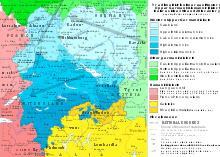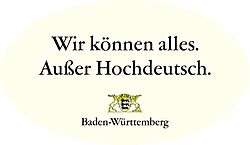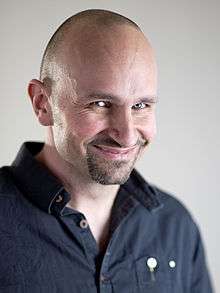Swabian German
Swabian (![]()
| Swabian | |
|---|---|
| Schwäbisch[1] | |
| Native to | Germany[1] |
Native speakers | 820,000 (2006)[2] |
| Latin (German alphabet) | |
| Language codes | |
| ISO 639-3 | swg |
| Glottolog | swab1242[3] |
| IETF | swg[4] |
 Areas where Alemannic dialects are spoken
Swabian | |
Description
Swabian can be difficult to understand for speakers of Standard German due to its pronunciation and partly differing grammar and vocabulary. For example, the Standard German term for "strawberry jam" is Erdbeermarmelade whereas in Swabian it is called Bräschdlingsgsälz.[7]
In 2009, the word Muggeseggele (a Swabian idiom), meaning the scrotum of a housefly, was voted in a readers' survey by Stuttgarter Nachrichten, the largest newspaper in Stuttgart, as the most beautiful Swabian word, well ahead of any other term.[7] The expression is used in an ironic way to describe a small unit of measure and is deemed appropriate to use in front of small children (compare Bubenspitzle). German broadcaster SWR's children's website, Kindernetz, explained the meaning of Muggeseggele in their Swabian dictionary in the Swabian-based TV series Ein Fall für B.A.R.Z.[8]
Characteristics
- The ending "-ad" is used for verbs in the first person plural. (For example, "we go" is mir gangad instead of Standard German's wir gehen.)
- As in other Alemannic dialects, the pronunciation of "s" before "t" and "p" is [ʃ] (For example, Fest ("party"), is pronounced as Feschd.)
- The voice-onset time for plosives is about halfway between where it would be expected for a clear contrast between voiced and unvoiced-aspirated stops. This difference is most noticeable on the unvoiced stops, rendering them very similar to or indistinguishable from voiced stops:
| "t" to "d" | "p" to "b" | ||
|---|---|---|---|
| German | Swabian | German | Swabian |
| Tasche (bag) | Dasch | putzen (to clean) | butza |
| Tag (day) | Dag | Papa (dad) | Baba |
- One obvious feature is the addition of the diminutive "-le" suffix on many words in the German language. With the addition of this "-le" (pronounced /lə/), the article of the noun automatically becomes "das" in the German language, as in Standard German. The Swabian "-le" is the same as standard German "-lein" or "-chen", but is used, arguably, more often in Swabian. A small house (Standard German: Haus) is a Häuschen in Standard German, a Heisle in Swabian. In some regions, "-la" for plural is used. (For example, Heisle may become Heisla, Spätzle becomes Spätzla.) Many surnames in Swabia are also made to end in "-le".
| German | Swabian |
|---|---|
| Zug (train) | Zigle |
| Haus (house) | Heisle |
| Kerl (guy) | Kerle |
| Mädchen (girl) | Mädle |
| Baum (tree) | Baimle |
- Articles (der, die and das) are often pronounced as "dr", "d" and "s" ("s Haus" instead of "das Haus").
- The "ch" is sometimes omitted or replaced. "ich", "dich" and "mich" may become "i", "di" and "mi".
- Vowels:
| German | Swabian | Example (German = Swabian) |
|---|---|---|
| short a [a] | [a] | machen = macha |
| long a [aː] | [ɔː] | schlafen = schlofa |
| short e [ɛ] | [e] | Mensch, fest = Mentsch, fescht |
| [ɛ] | Fest = Fäscht | |
| long e [eː] | [ɛa̯] | leben = läaba |
| short o [ɔ] | [ɔ] | Kopf = Kopf |
| long o [oː] | [aʊ̯] | hoch, schon = hau, schau |
| short ö [œ] | [e] | können, Köpfe = kenna, Kepf |
| long ö [øː] | [eː] | schön = schee |
| short i [ɪ] | [e] | in = en |
| long i (ie) [iː] | [ia̯] | nie = nia |
| short ü [ʏ] | [ɪ] | über = iber |
| long ü [yː] | [ia̯] | müde = miad |
| short u [ʊ] | [ɔ] | und = ond |
| long u [uː] | [ua̯] | gut = guat |
| ei [aɪ̯] | [ɔa̯], [ɔɪ̯][lower-alpha 1] | Stein = Schdoa/Schdoi |
| [a̯i][lower-alpha 2] | mein = mei | |
| au [aʊ̯] | [aʊ̯][lower-alpha 3] | laufen = laofa |
| [a̯u][lower-alpha 4] | Haus = Hous | |
| eu [ɔʏ̯] | [a̯i], [ui̯] | Feuer = Feijer/Fuijer |
In many regions, the Swabian dialect is spoken with a unique intonation that is also present when native speakers speak in Standard German. Similarly, there is only one alveolar fricative phoneme /s/, which is shared with most other southern dialects. Most Swabian-speakers are unaware of the difference between /s/ and /z/ and do not attempt to make it when they speak Standard German.
The voiced plosives, the post-alveolar fricative, and the frequent use of diminutives based on "l" suffixes gives the dialect a very "soft" or "mild" feel, often felt to be in sharp contrast to the harder varieties of German spoken in the North.
Phonology
Consonants
| Labial | Alveolar | Post- alveolar |
Palatal | Velar | Uvular | Pharyngeal/ Glottal | |
|---|---|---|---|---|---|---|---|
| Stop | p b | t d | k ɡ | ||||
| Affricate | b̥f | d̥s | (d̥ʃ) | ||||
| Nasal | m | n | ŋ | ||||
| Fricative | f v | s | ʃ | (ç) | x (ɣ) | ʁ | (ʕ) h |
| Approximant | l | j |
- Voiceless stops are frequently aspirated as [pʰ tʰ kʰ].
- Allophones of /ʁ/ are often a pharyngeal or velar sound, or lowered to an approximant [ʕ] [ɣ] [ʁ̞].
- [ç] occurs as an intervocalic allophone of /x, h/.[9]
Vowels
| Front | Central | Back | |||||
|---|---|---|---|---|---|---|---|
| short | long | short | long | short | long | ||
| Close | ɪ~i | iː | u | uː | |||
| Close-mid | e | eː | ə | o | oː | ||
| Open-mid | ɛ | ɛː | (ɐ) | ʌ | ɔ | ɔː | |
| Open | a | aː | |||||
- /a/ preceding a nasal consonant may be pronounced as [ɐ]. When /a/ is lengthened, before a nasal consonant, realized as [ʌː].
- /ə/ preceding an /r/ can be pronounced as [ʌ].[10]
| Front | Central | Back | |
|---|---|---|---|
| Close | iə | uə, ui | |
| Mid | eə | əi | əu, ɔe |
| Open | ae | ao |
Classification and variation
Swabian is categorized as an Alemannic dialect, which in turn is one of the two types of Upper German dialects (the other being Bavarian). The ISO 639-3 language code for Swabian is swg.[11]

The Swabian dialect is composed of numerous sub-dialects, each of which has its own variations. These sub-dialects can be categorized by the difference in the formation of the past participle of 'sein' (to be) into gwäa and gsei. The Gsei group is nearer to other Alemannic dialects, such as Swiss German. It can be divided into South-East Swabian, West Swabian and Central Swabian.[12]
Recognition in mass media

The Baden-Württemberg Chamber of Commerce launched an advertising campaign with the slogan "Wir können alles. Außer Hochdeutsch." which means "We can [do] everything. Except [speak] Standard German" to boost Swabian pride for their dialect and industrial achievements.[13] However, it failed to impress Northern Germans[14] and neighboring Baden. Dominik Kuhn (Dodokay) became famous in Germany with schwäbisch fandub videos,[15] dubbing among others Barack Obama with German dialect vocals and revised text.[16]
Swabian dialect writers
- Sebastian Sailer (1714–1777)
- August Lämmle (de) (1876-1962)
- Josef Eberle (as Sebastian Blau) (de) (1901-1986)
- Thaddäus Troll (1914–1980)
- Hellmut G. Haasis (born 1942)
- Peter Schlack (de) (born 1943)
- Gerhard Raff (born 1946)
See also
References
- "Swabian". Ethnologue. Retrieved 2019-04-25.
- Swabian at Ethnologue (18th ed., 2015)
- Hammarström, Harald; Forkel, Robert; Haspelmath, Martin, eds. (2017). "Swabian". Glottolog 3.0. Jena, Germany: Max Planck Institute for the Science of Human History.
- "Swabian". IANA language subtag registry. 29 July 2009. Retrieved 11 January 2019.
- [http://www.goethe.de/ins/ge/prj/dig/his/lig/deindex.htm%22Geschichte+der+deutschen+Siedler+im+Kaukasus+-+Leben+in+Georgien+-+Goethe-Institut+2019%22.+www.goethe.de.+Retrieved+30+January+2019.
- Gehl, Hans. "Donauschwäbische Dialekte, 2014". www.sulinet.hu (in German). Sulinet Program Office (Hungary) in cooperation with the Ministry of Education. Retrieved 30 January 2019.
- Schönstes schwäbisches Wort, Großer Vorsprung für Schwabens kleinste Einheit Archived 2013-09-27 at the Wayback Machine, Jan Sellner 09.03.2009, Stuttgarter Nachrichten
- Swabian dictionary Archived 2015-06-03 at the Wayback Machine at website of Südwestrundfunk Ein Fall für B.A.R.Z.
- Russ, Charles V. J. (1990). Swabian. The Dialects of Modern German: a Linguistic Survey: Routledge. pp. 337–363.
- Frey, Eberhard (1975). Stuttgarter Schwäbisch: Laut- und Formenlehre eines Stuttgarter Idiolekts. Deutsche Dialektgeographie, 101: Marburg: Elwert. pp. 8–45.CS1 maint: location (link)
- Code for Swabian German (swg)
- Noble, Cecil A. M. (1983). Modern German dialects New York [u.a.], Lang, p. 63.
- Baden-Württemberg Chamber of Commerce Archived 2007-11-10 at the Wayback Machine
- Diskriminiteer Dialekt Armes Süddeutsch FAZ 2013
- Graham, Dave (2010-10-14). "Star Wars dub sends jobbing ad man into orbit". Reuters.
- Barack Obama Schwäbisch - Rede Berlin 2013 - dodokay
Literature
- Streck, Tobias (2012). Phonologischer Wandel im Konsonantismus der alemannischen Dialekte Baden-Württembergs : Sprachatlasvergleich, Spontansprache und dialektometrische Studien (in German). Stuttgart: Steiner. ISBN 978-3-515-10068-7.
- Cercignani, Fausto (1979). The consonants of German : synchrony and diachrony. Milano: Cisalpino-Goliardica. LCCN 81192307.
External links
| For a list of words relating to Swabian language, see the Swabian language category of words in Wiktionary, the free dictionary. |